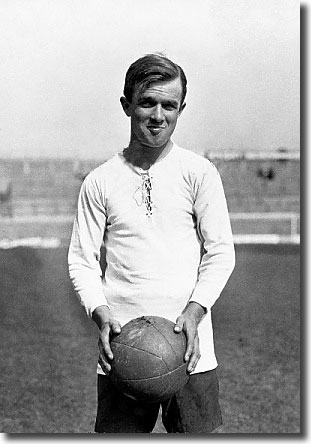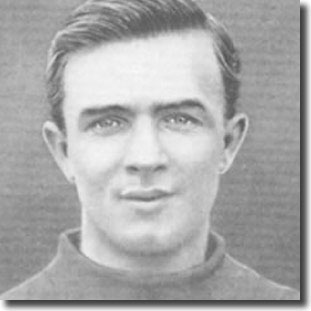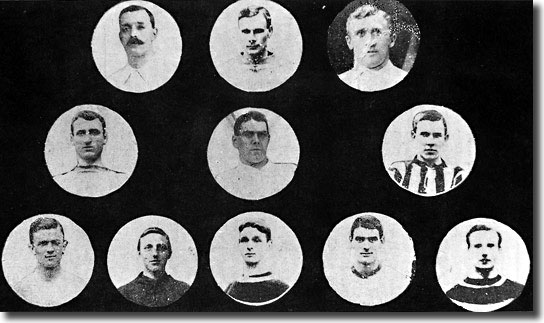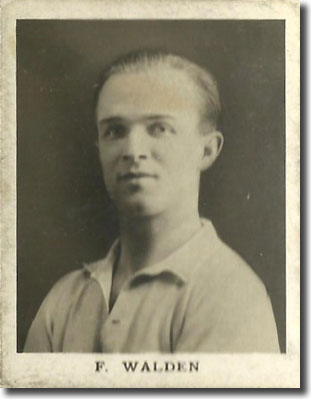 Born:
Wellingborough, 1 March 1888
Born:
Wellingborough, 1 March 1888
Frederick Ingram 'Fanny' Walden at 5ft 2 ½ in and 8 stone 9 lb is the
smallest footballer ever to represent England at a senior level. 'Fanny'
is generally thought to be a contemporary term for anyone of dainty physique,
though it is also claimed he was nicknamed after the owner of a local
sweet shop.
The legendary Herbert Chapman,
who had charge of Walden in his early days at Northampton, had the insight
to transform him from an inside-forward into a winger, teaching him how
to apply his natural talent and send in telling crosses. Walden developed
into a tricky and dangerous winger, known for his 'darting, jinking runs
down the right flank', a low centre of gravity making him difficult to
knock off the ball.
Walden was described by his contemporary, Ivan Sharpe, as 'the Tom Thumb
of first class football … Herbert Chapman found him under a divot at the
Wellingborough ground… He was so small that he was difficult to charge,
and an opponent who did so at all unceremoniously was usually admonished
by the crowd. But Walden did not reach the heights merely because he was
a freak footballer. Chapman certainly had a ready eye for a player who
was a crowd magnet, but Walden was also a first class outside-right. He
was a neat rather than tricky player, and relied for success on elusiveness,
judgement and ball control.'
Charlie Buchan: 'He was so bewilderingly clever that I pay him the compliment
of comparing him with the great Stanley Matthews. Walden could beat his
man in many ways and rarely wasted a ball. His twinkling feet took him
past the biggest opponent like a flash.'
Born in Northamptonshire, Walden began locally with junior clubs White
Cross, All Saints, Rodwell and Wellingborough while working as a moulder
in a foundry. He was given an opportunity to break into senior football
when Northampton Town manager Chapman offered him terms with the Southern
League club.
Stephen Studd in Herbert Chapman: Football Emperor: 'As Chapman
set about maintaining the momentum of his Northampton team after their
1909 championship, and went in search of new players, transfer fees were
not a problem. He made an exciting discovery at Wellingborough. Outside-right,
Fred "Fanny" Walden, 21, was just over 5 feet tall, weighed
less than nine stone and looked easy meat for burly defenders. But what
he lacked in build he made up for in speed and skill, nipping in and out
of solid defences with astounding ease. He came into the Northampton side
at home to Luton on 30 October and scored a hat trick in a 6-1 win, following
this with another against Southend in December. And he cost Chapman nothing.
'Walden was so small that on one occasion, entering the players' quarters
behind his team mates on arrival at an away game, he was told, "Go
away, sonny," by an official. His size, combined with considerable
talent, made him a popular figure at Northampton and Chapman called him
a "star artist" who could draw the crowds and  was
"largely the making of the Northampton team".'
was
"largely the making of the Northampton team".'
Despite some heavy home victories during the 1909/10 campaign, the Cobblers'
hopes of retaining their title ended with a number of defeats in March
and April; they came fourth, finishing in similar positions over the next
two seasons before Herbert Chapman accepted
the job of secretary-manager at Second Division Leeds City in 1912.
Chapman was quick to try and take one of his outstanding talents with
him to Elland Road.
Stephen Studd: 'Disappointed supporters demanded to know why Chapman
had not signed any new players since the summer. It was not, he answered,
through want of trying: clubs were either unwilling to sell so early in
the season, or were asking too high a fee. Even junior clubs were holding
on to their players. It would not, he admitted, be hard to find players
who were "fairly good", but they would not strengthen the team;
nothing but the best would do. Then in November came a golden opportunity.
back to top
'Northampton Town, languishing since Chapman's departure and losing money
at the rate of £30 a week, were open to offers for Fanny Walden. Chapman
jumped at the chance, but the Cobblers' supporters were determined that
Walden should stay, and a "shilling fund" was set up to thwart
the designs of their former manager. It worked, and by the end of the
month the deal was off.'
Chapman confessed, 'In no instance have I personally suffered so great
a disappointment.' He remained hopeful of securing Walden in the future,
for he 'would be the making of the Leeds City team if only I could get
him to Elland Road'.
Northampton continued to struggle to make ends meet and in April 1913,
Tottenham Hotspur were successful with a record £1,700 bid for his signature.
He made his debut in a 1-1 draw with Woolwich Arsenal on 19 April; it
was reported that 'during the game, his cleverness brought forth more
enthusiasm than the performance of the other 21 players. There is no doubt
about it, Walden will do for Spurs.'
do for Spurs.'
Walden had represented the Southern League on three occasions while with
Northampton and his reputation was only enhanced during his time with
Tottenham. He won his first England cap on 4 April 1914 in a 3-1 defeat
by Scotland at Hampden Park in front of a crowd of 105,000. Before official
competition was brought to an end in 1915, he scored six goals in 69 League
appearances, though he could not prevent Spurs finishing bottom in that
final season.
Walden was reunited with Herbert Chapman at the start of the 1915/16
season.
Stephen Studd: 'Fanny Walden offered his services to Leeds City while
working with a nearby firm of motor engineers. Tottenham were furious
and protested to the League, only to be told that under wartime regulations
it was perfectly in order. Not to be put off, Spurs urged the FA to hold
an inquiry - but to no avail.'
A sub-committee of the League, consisting of John McKenna, J J Bentley
and C E Sutcliffe, met at Preston on 13 September and confirmed Walden
was available for selection by Leeds as he was employed in the city.
The Yorkshire Evening Post announced Walden's arrival with glee:
'The London crowds went wild with delight over the skill of Walden, who
has been variously, if extravagantly, described as "the little marvel",
"the wonder wizard" and "the twinkling star". Although
he stands only 5ft 4in, Walden in the season before last provided the
sensation of English League football and it was a popular choice when
he was given the outside-right position in the English team against Scotland
that season.'
The diminutive forward was one of the finest players to sport Leeds colours
during the war years and he gave some outstanding displays during the
1915/16 season. His City debut came on the opening day, away to Derby
on 4 September, a game City won 3-1.
An ever present, he was generally acknowledged as the club's best player,
scoring twice in 36 appearances.
In April 1916, Walden joined the air section of the Royal Naval Reserve,
which made it difficult to continue assisting the Peacocks. At the start
of the following season, Walden,
by now a lieutenant, was required for training in the South of England,
but he managed to get away for a couple of appearances before having to
permanently sever his relationship with City.
air section of the Royal Naval Reserve,
which made it difficult to continue assisting the Peacocks. At the start
of the following season, Walden,
by now a lieutenant, was required for training in the South of England,
but he managed to get away for a couple of appearances before having to
permanently sever his relationship with City.
He played some wartime football for Spurs over the next three years,
scoring 14 goals in 67 appearances, and represented England against Scotland
in a military international.
Walden became a cornerstone of Tottenham's success in the post-war years.
He helped Spurs win the Second Division title in 1920, scoring four times
in 31 games, but injury saw him miss out on the Londoners' 1921 FA Cup
triumph.
Walden represented the Football League once and gained his second cap
on 13 March 1922 when England beat Wales 1-0 at Anfield.
By 1926, age and injuries had caught up with Walden and Tottenham released
him to return to Northampton Town, by now a Third Division club. He had
played more than 300 times for Spurs, including 215 in the League. He
retired as a player in April 1927.
Walden was also a gifted first class cricketer, playing 258 times for
Northamptonshire CCC between 1910 and 1929, scoring over 7,000 runs and
taking more 119 wickets as a slow right hand bowler. He later became an
unmpire, standing in 212 first class matches and eleven tests between
1930 and 1939.
Walden had a number of business interests, opening a car showroom in
Northampton and a sports shop in Tottenham, which he ran with team mate
Bert Bliss.
He died in Northampton, aged 61, on 3 May 1949.
back to top











 Born:
Wellingborough, 1 March 1888
Born:
Wellingborough, 1 March 1888 was
"largely the making of the Northampton team".'
was
"largely the making of the Northampton team".' do for Spurs.'
do for Spurs.' air section of the Royal Naval Reserve,
which made it difficult to continue assisting the Peacocks. At the start
of the following season, Walden,
by now a lieutenant, was required for training in the South of England,
but he managed to get away for a couple of appearances before having to
permanently sever his relationship with City.
air section of the Royal Naval Reserve,
which made it difficult to continue assisting the Peacocks. At the start
of the following season, Walden,
by now a lieutenant, was required for training in the South of England,
but he managed to get away for a couple of appearances before having to
permanently sever his relationship with City.